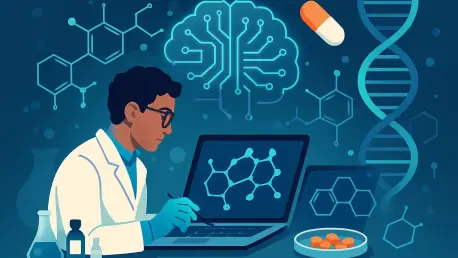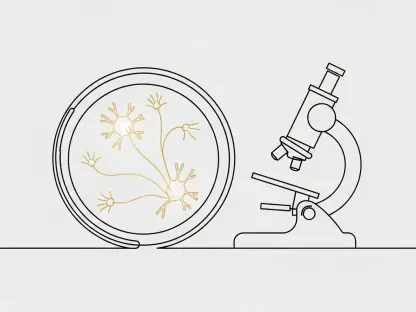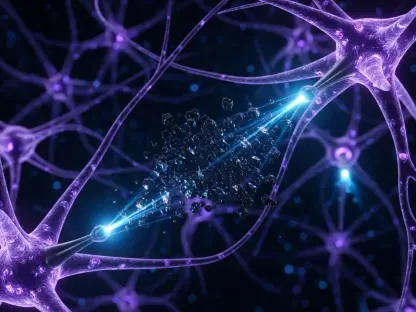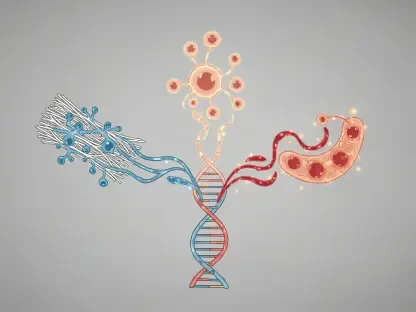In a world where complex diseases like cancer and neurodegenerative disorders continue to challenge medical science, a transformative approach is emerging through artificial intelligence (AI). Imagine a tool so precise that it can predict the exact genetic targets needed to reverse a diseased cell’s state to healthy, bypassing years of trial and error in drug development. This isn’t a distant dream but a reality being shaped by cutting-edge platforms that harness the power of AI to tackle intricate health conditions. Traditional methods often focus on single targets, missing the broader network of interactions that define diseases with multiple pathways. Now, with innovative technology, the potential to address these gaps is within reach, promising a future where treatments are not only faster to develop but also more effective. This shift could redefine how humanity confronts some of the most stubborn medical challenges, sparking hope for millions awaiting better solutions.
Breaking New Ground with AI in Medicine
Transforming Drug Discovery with Smart Networks
The landscape of drug discovery is undergoing a seismic shift with the introduction of AI platforms that prioritize a systems-based approach over the conventional one-drug-one-target model. A standout in this arena is a novel tool that uses graph neural networks to map out complex cellular interactions. By integrating vast datasets of gene expression from both diseased and treated states, this technology constructs detailed network representations. These networks help in identifying not just individual targets but combinations of genes and pathways critical for reversing disease phenotypes. Unlike older methods that often stumble when addressing multifaceted conditions, this approach acts as a strategic guide, pinpointing precise interventions with remarkable clarity. The result is a dramatic reduction in the guesswork that has long plagued therapeutic development, offering a streamlined path to potential breakthroughs for diseases that have resisted traditional solutions.
Outperforming Expectations in Real-World Tests
Extensive testing across diverse datasets has demonstrated the superior capabilities of this AI-driven approach in practical scenarios. Focused on numerous cancer types, the technology has been evaluated using both genetic and chemical interventions, achieving accuracy rates significantly higher than competing methods. Its ability to rank therapeutic targets with precision—often outperforming other tools by double-digit percentages—marks a significant advancement. Additionally, the speed at which it processes data and learns from new information is unparalleled, making it adaptable even to conditions outside its initial training scope. Validated targets identified for specific cancers align closely with clinical evidence, reinforcing confidence in its potential. This performance underscores a pivotal moment in medical research, where AI not only matches but exceeds expectations, paving the way for more reliable and efficient drug discovery processes.
The Future of Precision Medicine
Unlocking Mechanisms and Combination Therapies
Beyond identifying targets, AI platforms are shedding light on the intricate mechanisms behind drug actions, a crucial step for advancing therapeutic design. By analyzing how specific compounds influence gene networks, this technology reveals pathways through which treatments can shift cells toward healthier states. Such insights are invaluable for understanding drug behavior at a molecular level, supporting efforts in mechanism discovery and even drug repurposing. Furthermore, the ability to rank thousands of genes based on their role in disease reversal opens doors to alternative targets within overlapping pathways. This facilitates the creation of combination therapies, which are essential for overcoming resistance and redundancy often seen in complex conditions like cancer. The depth of analysis provided by AI ensures that treatments can be tailored to address multiple facets of a disease, enhancing overall efficacy and reducing the likelihood of setbacks during clinical application.
Personalization and Expansion to New Frontiers
The adaptability of AI tools to patient-specific data heralds a new era of personalized medicine, where treatments are customized to individual profiles for maximum impact. This capability allows for the fine-tuning of therapeutic strategies based on unique genetic and environmental factors, a significant leap from the one-size-fits-all approaches of the past. Meanwhile, research teams are pushing boundaries by applying these models to neurodegenerative disorders such as Parkinson’s and Alzheimer’s, aiming to map cellular-level reversal strategies for conditions beyond cancer. The vision is to create a versatile framework that can tackle a wide array of diseases, each with its own complex network of challenges. As this technology evolves, the prospect of delivering highly targeted interventions to patients worldwide becomes increasingly tangible, promising a future where medical solutions are as diverse as the diseases they aim to conquer.
Reflecting on a Paradigm Shift
Looking back, the journey of integrating AI into drug discovery marked a turning point in how complex diseases were approached. Rigorous evaluations across varied datasets showcased unprecedented accuracy and speed, while insights into drug mechanisms illuminated paths previously shrouded in uncertainty. The alignment with clinical evidence for numerous targets validated the technology’s reliability, setting a strong foundation for its broader application. Moreover, the exploration into personalized treatments and expansion into diverse medical fields like neurodegenerative disorders highlighted a commitment to innovation. As a next step, stakeholders in medical research should prioritize collaboration to refine these tools, ensuring they adapt to emerging challenges. Investing in accessible data integration and fostering interdisciplinary partnerships will be key to scaling these advancements, ultimately transforming the landscape of healthcare with solutions that were once unimaginable.









